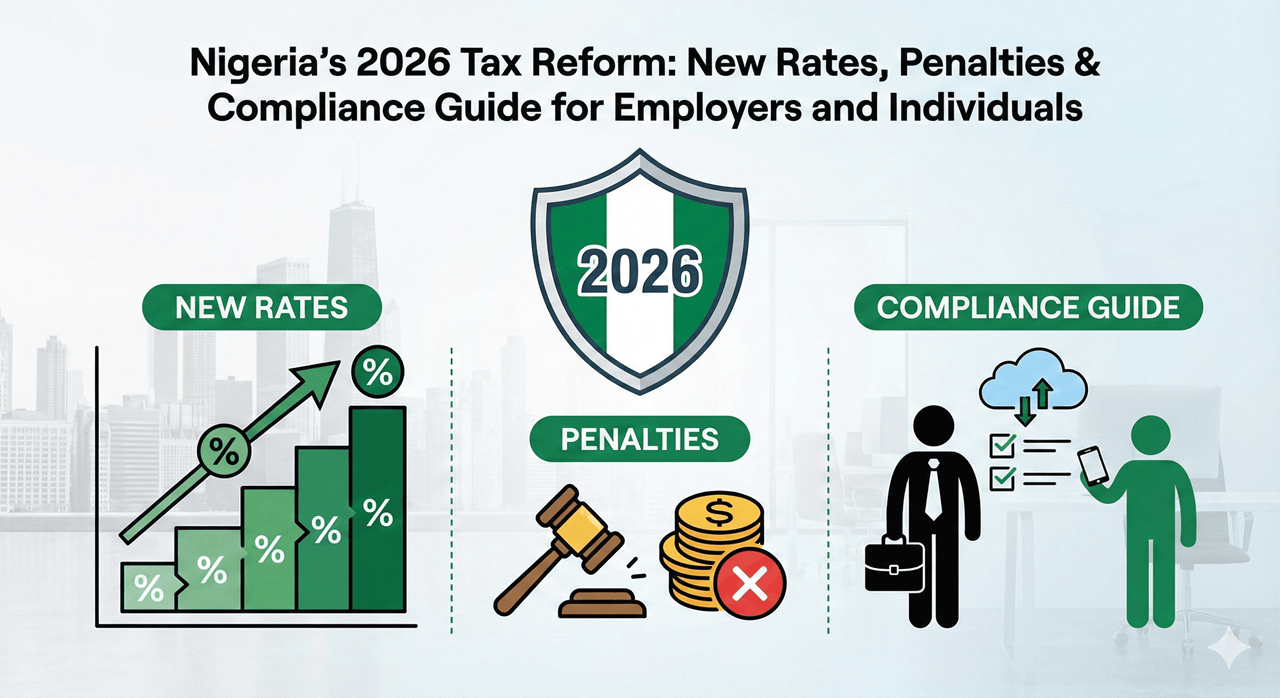The True Cost of Payroll Errors in Africa and How to Avoid Them

A Strategic Guide for Managing Compliance, Costs, and Culture
Payroll in Africa isn’t just about “getting salaries out on time.”
In high-growth economies like Nigeria, Kenya, and South Africa, payroll management is a complex, high-stakes process where mistakes can ripple far beyond the finance department — hitting compliance, cash flow, employee morale, and even brand reputation.
While some errors seem small — a wrong tax code here, a duplicated allowance there — their real cost is staggering.
The Hidden Cost of Payroll Errors
Payroll errors — such as incorrect tax codes, late submissions, and duplicated allowances — can lead to substantial financial losses for employers.
- UKG research shows payroll mistakes affect 1 in 5 employees and cost companies millions each year in corrections, penalties, and lost productivity (UKG report).
- The American Payroll Association (APA) estimates that manual payroll systems have error rates as high as 8%, especially in time tracking and tax code application — often leading to costly overpayments and compliance risks (APA Best Practices).
- EY’s Global Payroll Survey found that compliance failures — such as late filings or incorrect submissions — can cost mid-sized firms over $100,000 annually in penalties and lost productivity (EY global payroll page).
These figures aren’t just theory — in Africa’s diverse and fast-changing regulatory environment, the risks are even higher.

Common Payroll Errors & Their Consequences
| Error Type | Description | Potential Impact |
| Incorrect Tax Withholding | Applying wrong tax codes, failing to update tax rates, or miscalculating taxable allowances. | Fines and interest charges from tax authorities. A company was penalized ₦1.8 million for underpaying PAYE taxes by 15% over an 18-month period. |
| Late Statutory Submissions | Missing deadlines for remitting taxes or statutory contributions. | Fixed penalties and monthly interest. In South Africa, late Unemployment Insurance Fund (UIF) contributions result in a fixed ZAR 500 penalty plus ten percent interest per month. |
| Duplicated Allowances | Paying the same benefit twice or misclassifying taxable allowances. | Overpayments that lead to unnecessary cash outflow. A calculation error of ₦5,000 per employee per month can accumulate to an annual loss of ₦6 million for a company with 100 employees. |
| Employee Misclassification | Misclassifying a worker as an independent contractor when they should legally be an employee. | Heavy fines, legal action, and a damaged reputation. In Kenya, this can lead to fines of up to 200% of unpaid wages. |
| Poor Record-Keeping | Missing, incomplete, or disorganized payroll documentation required by law. | Extended audit periods, legal fees, management time spent searching for documents, and fines from authorities. |
| Miscalculated Overtime/Leave | Errors in computing extra hours worked, overtime rates, or leave balances. | Underpayments or overpayments, leading to employee dissatisfaction, reduced morale, and potential disputes. |
| Currency Conversion Mistakes | Manual errors in calculating exchange rates for expatriate or cross-border payments. | Payment discrepancies, budget overruns, and reconciliation issues. |
| Manual Data Entry Errors | Typos or formula mistakes when using spreadsheets or outdated systems. | Cascading errors that affect tax, benefits, and net pay. The “shadow labor cost” of time spent on error remediation is significant. |

1.1 Direct Financial Losses
For African businesses, penalties for payroll errors can escalate quickly:
- Nigeria — PAYE underpayment can trigger a 10% sanction plus interest, with some companies fined ₦1.8M for a 15% shortfall over 18 months.
- South Africa — late UIF contributions incur a fixed ZAR 500 penalty plus 10% interest per month, while SARS can impose 10% penalties plus interest for incorrect returns.
Overpayments can be just as damaging — paying an extra ₦5,000 to 100 employees each month equals ₦6M a year lost in unnecessary cash outflow.
1.2 The “Shadow Labor” Cost
Beyond money, payroll errors drain time. In Kenya, payroll officers spend an average of 8 hours per pay cycle fixing mistakes — nearly six working weeks annually devoted to remediation instead of strategic work.
Senior accountants and HR leaders often get pulled into last-minute fixes, diverting focus from expansion, client service, or investor engagement.
1.3 Impact on Trust and Talent
Payroll mistakes can:
- Erode employee trust — Workforce Africa polling shows 33% of workers experiencing two consecutive payroll errors start job hunting within 90 days.
- Increase turnover costs — replacing skilled staff in Lagos, Nairobi, or Johannesburg averages $4,800 per hire, excluding lost productivity.
Damage brand reputation — repeated payroll issues can deter both top talent and potential partners.
Why Payroll Errors Are So Common in Africa
2.1 Outdated, Manual Systems
Many African businesses still rely on spreadsheets — a major risk factor for miscalculations, missed updates when tax rates change, and data breaches.
2.2 Complex, Fragmented Regulations
With 54 distinct tax and labor frameworks, Africa’s payroll landscape demands constant vigilance. Laws shift mid-year, rates adjust retroactively, and each country’s filings have unique formats.
For example, a Ghanaian agribusiness once paid $12,000 in penalties for missing Burkina Faso’s local social security deadline — simply because it didn’t have localized expertise.
2.3 High-Risk Common Mistakes
- Employee misclassification — in Kenya, fines can reach 200% of unpaid wages.
- Incorrect tax withholding — especially where multiple tax authorities exist (e.g., Nigeria).
- Poor record-keeping — missing documents can trigger extended audits.
Miscalculated overtime/leave — affects compliance and morale.

How to Avoid Payroll Errors in African Markets
3.2 Outsource for Compliance Confidence
Working with an Employer of Record (EOR) such as Remote Solutions Africa or local payroll provider ensures filings meet each country’s rules and deadlines — while giving you access to advanced payroll tech without the capital expense.
3.3 Build a Culture of Compliance
Even with automation:
- Separate payroll calculation from payment authorization.
- Audit regularly
- Keep complete, organized employee records for the legally required retention period.
Conclusion
In Africa, payroll errors are not just admin slip-ups — they’re strategic risks that can drain cash, waste time, and harm your employer brand.
The companies winning in this space treat payroll as a core business function, not an afterthought — investing in automation, tapping into local expertise, and embedding compliance into their culture.
Get it right, and payroll stops being a liability — it becomes a competitive advantage.




































